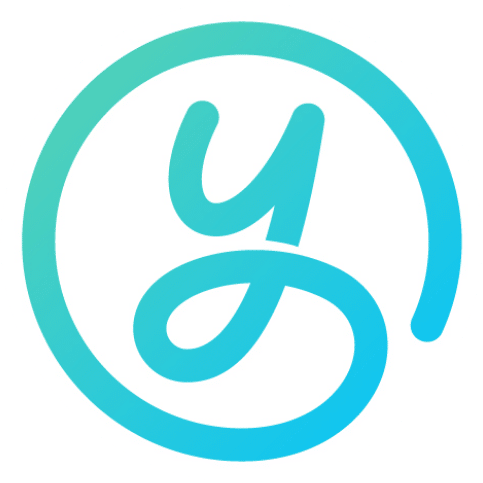If you are looking for guidance on the U of T Engineering Online Student Profile, including U of T Personal Profile questions prep tips and examples, then you’ve come to the right place.
This guide is based on the 2024/2025 application.
In the meantime, if you’re serious about getting into U of T Engineering, we recommend you schedule a free consultation for our 1-on-1 Youth Coaching services.
Before you dive in, it’s important to understand that the U of T Engineering admissions committee receives thousands of applications every year. To help you stand out from the crowd, you need to demonstrate a clear sense of self, strong life experience, and exemplary real-world skills, and audacious goals.
We recommend reading both our Deductive Communication Approach™ and Narrative Communication Approach™ Guides to empower you with the skills to communicate all these things in a clear, compelling, and concise way on your Profile.
You’ll notice that all the written and video Personal Profile question examples in this guide follow these two communication styles. The purpose of sharing these structures is to help teach you best-practice processes for communication. If you aren’t sure which communication you should use, we’re always here to help.
Using these essay structures does not mean your essays will be the same as other students’ because they’re designed to help you create unique answers that are completely authentic to your individual identity and experiences.
If you’re serious about getting into U of T Engineering and reaching your fullest post-secondary potential, connect with a coach. It’s never too early to receive coaching!
Table of Contents
- U of T Engineering Online Student Profile: Application sections; Deadline; Evaluation criteria; and More.
- 2024/2025 U of T Engineering Personal Profile: Overview; Possible written and video questions; Interview question examples and prep tips; and More.
- Common Questions about the U of T Engineering App: Do I have to do a Personal Profile?; Is the Personal Profile a real interview?; How do I prepare for the Personal Profile questions?; and More.
Engineering U of T: Portal & Online Student Profile
U of T Engineering: Application Overview
Before getting started on your Profile, you need to complete and submit your OUAC application (101 application for current high school students and 105 application for transfer students and all other applicants). The deadline for the OUAC application is January 15, 2025 (see other important dates and deadlines here).
Once you’ve done that, U of T will send you an email with instructions within 7-10 days about how to set up your JOIN U of T account.
Then, you will log into the Engineering Applicant Portal to access and complete your Online Student Profile (OSP), which is a mandatory part of the U of T Engineering admissions process. The OSP is due on January 15, 2025.
However, the early consideration deadline for U of T Engineering’s Online Student Profile Deadline is December 2, 2024. This is for domestic and international students.
COACH’S TIP: Throughout the entire application process (from when you apply on OUAC to when you get your offer), make sure to check our Engineering Applicant Portal often. This is the main way that U of T Engineering will contact you or give you updates, so you want to make sure that you don’t miss a message for them that could put your application at risk. You can also check the status of your application through the U of T Engineering portal.
The U of T Online Student Profile has 6 sections:
- Engineering Program Selection: Rank the engineering programs you want to be considered for (you can choose up to 4 U of T Engineering programs here). Rank your choices in order of preference (i.e. with your top choice as #1, followed by #2, #3, and #4). You will receive ONE offer of admission.
- Academic Timeline: Outline your academic activity from Grade 9 to the present. Most of this information can be taken directly from your OUAC application.
- Other Information: Submitting standardized test scores or detailing plans to meet English language requirements; all other fields are optional. Applicants must enter details of any AP, SAT, or ACT exams taken or planned, and have official scores sent directly using provided institution codes. An Optional Applicant Statement is available for any additional academic history or personal challenges that may impact the application. For those with significant personal, health, or accessibility concerns, the Special Consideration section allows for requests for special accommodation in the admissions process, with appropriate documentation required.
- Academic Profile: Select institutions and any secondary and post-secondary courses you have taken at those institutions.
- Extracurricular Activities: Detail your activities outside of the classroom, like paid/unpaid employment, hobbies, clubs, sports, etc. You will indicate the type of activity and briefly describe it and start/end dates. Be as specific and concise as possible in the description and describe the key skills you’ve developed, what you’ve learned, and how it has helped you grow as a person.
- Extracurricular Essay. Write a 300-350-word essay related to the skills you’ve gained through those extracurriculars, and how it shaped your decision to apply to the U of T program.
- Personal Profile: Answer 3 randomly selected questions (1 written and 2 video questions). Keep reading to learn more about these questions and how to answer them in a memorable and unique way.
THE EXTRACURRICULAR ESSAY
“Use the box below to reflect on how your involvement in a particular extracurricular activity (or activities) may have shaped your plan to study in the program(s) you had selected for U of T Engineering. We highly encourage you to use this space to articulate your interest(s) for your selected Engineering program(s). (300-350 words)“
When tackling this question, you should start by reflecting on your extra-curricular activities, volunteerism, and work experience to identify specific skills and interests you’ve developed.
We recommend focusing on ONE activity. 300-350 words is too short to write about more than one unless they are related enough.
The two parts of the question are:
- The skills and interests you developed.
- The ways this shaped your desire to study at U of T Eng.
These two should connect. Don’t say something like “I developed sales skills” which led me to want to study “Mechanical engineering”.
Before writing, always focus on developing an overarching narrative. Spend the time really brainstorming the topic, in excruciating detail, and ensure the theme of the essay makes sense and is unique.
We offer a great structure in our template.
EXAMPLE ONLY
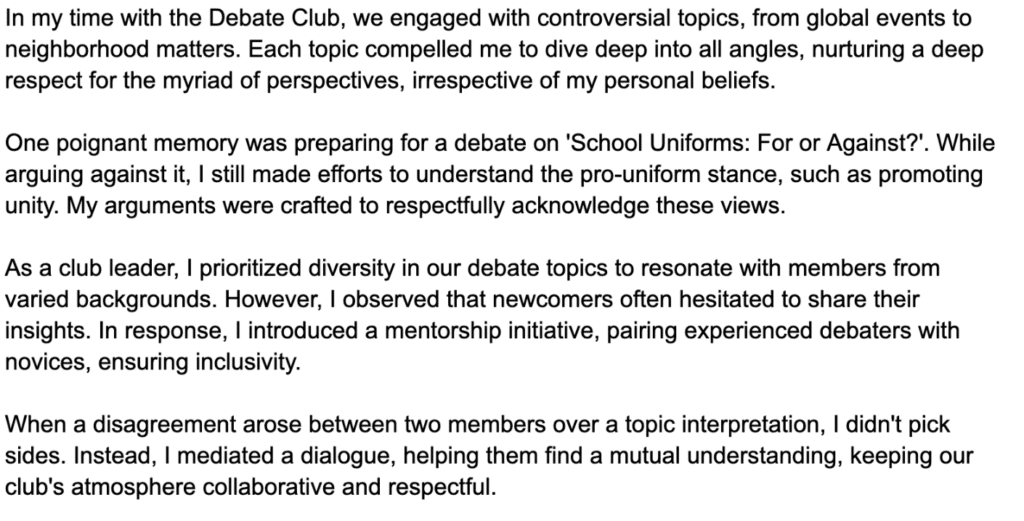
COMPLETING THE Online Student Profile
Once you have completed different sections of the Online Student Profile, you will see a checkmark beside that section on your dashboard. You can also see the required documents that U of T has received as well as standardized testing results (if applicable).
The deadline for the Online Student Profile and all required documents (through the U of T Engineering portal) is January 15, 2025 for regular consideration (for early consideration, check the deadlines here).
IMPORTANT: Submitting your application to U of T for early consideration as an OUAC 101 applicant will NOT impact the admission decision or give you a better chance of getting accepted. The only difference is that if you are accepted, you might receive an admission decision earlier than someone who applied for regular consideration. Click here to learn more information, and if you have questions, connect with a coach any time for support.
When deciding who to accept into the program, the admissions committee uses a ‘Broad-Based Admissions’ approach, where they evaluate you beyond your grades, considering your achievements, skills, and extracurriculars outside of the classroom.
This is where the Online Student Profile comes in. This Profile gives a full snapshot of these broad-based evaluation criteria, including your academic achievements, extracurricular involvement, and the information you provide in your Personal Profile answers (more on these below).
It’s your one chance to make a lasting first impression and show why you’re a perfect fit for the U of T Engineering program.
Keep reading for a breakdown of the Personal Profile, as well as possible written/video questions, prep tips, examples, common questions about the application, and much more.
If you have questions about this year’s Online Student Profile or you need help with your Personal Profile, connect with a coach for 1-on-1 support.
You Might Also Like
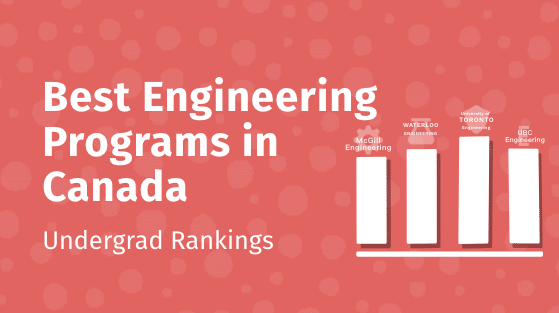
Rankings & Lists
Best Engineering Schools in Canada 2024/2025 (Undergraduate Programs)
Want to learn what the best universities in Canada for Engineering are? You’ve come to the right place. We know… Read more
University of Toronto Engineering Personal Profile
U of T Engineering: Personal Profile – Overview
As mentioned above, the U of T Engineering Personal Profile is one part of the Online Student Profile.
You will access the Personal Profile through your Online Student Profile in the U of T Engineering Portal. The entire Personal Profile is completed through a third-party site.
The Personal Profile will take about 30 minutes total to complete. It consists of 3 randomly selected questions.
| # | Format | Preparation | Response Time | Word Count |
| 1 | Written | n/a | 10 m | 300-350 words |
| 2 | Video | 2 m | 2 m | n/a |
| 4 | Video | 3 m | 3 m | n/a |
REMEMBER: You only get ONE attempt at these 3 questions. Once you click the ‘Start Interview’ button, you must complete the entire Personal Profile at once.
When you are taken to the external video platform page, click the “Check In” button, and then watch the Welcome Video and do the Registration and Device Setup.
COACH’S TIP: Before recording your final written/video questions, you will get unlimited practice questions. Use these questions as an opportunity to get comfortable with the platform and how the process feels. These answers will not be shared with the reviewers, so do as many as it takes for you to feel confident and prepared.
The Personal Profile is evaluated by members of the U of T community who have been carefully selected and trained. They’re looking for students who are articulate, passionate, and dedicated. They also want to see that you can work well under pressure, have the drive to succeed in the program, and can think critically to solve problems.
We know that this is super stressful. But the best thing that you can do for this part of your Profile is to stay calm and be yourself and let your personality shine.
If you need help as you prepare for the U of T Engineering Personal Profile written and video questions, connect with a coach for support. We’ll help you prepare answers to possible questions, do mock interviews, and share tips that have helped hundreds of students get into their top-choice programs.
U of T Engineering: Personal Profile – Possible Questions
The U of T Engineering Personal Profile questions generally fall into these 2 question types:
1. U of T ENGINEERING PERSONAL PROFILE – PERSONAL QUESTIONS
Before they review your Personal Profile, the admissions committee doesn’t know much about your personality and work ethic, your interest in engineering, your skills and strengths, and your goals for the future.
IMPORTANT: The first question (written) will be a short essay (300-350 words) where you talk about an experience you’ve had that has taught you something, allowed you to grow, built your skills etc. This is also a personal question.
The first video question will usually be a personal question that asks you to introduce yourself and talk about who you are and your interests (specifically in engineering).
Keep reading for possible questions and examples for personal questions.
Personal questions are meant to allow the interview to get to know you beyond your grades by focusing on topics like:
- Interests & Goals
- Leadership & Responsibility
- Role Models & Influential Factors
- Accomplishments & Achievements
- Creativity & Innovation
- Teamwork & Collaboration
- Social Issues & Helping Others
- Resilience & Failure
- Morality & Integrity
- Dealing with Conflict
- And much more!
To help you prepare for any personal question you might get on your Personal Profile (both written and video), we’ve created a strategy to help simplify the prep process.
We’ve broken down many common interview questions into themes, so you can come up with talking points for each, and then simply adapt these points to any question you’re given. Trust us, this is the EASIEST and most EFFECTIVE way to prepare for your U of T Engineering Personal Profile. Check out the full process in our Interview Prep Skills Guide for tips and answer templates/examples, and connect with a coach any time for support.
COACH’S TIP: For personal questions, we recommend using storytelling to help make your answers more unique, memorable, and authentic. Check out our Narrative Communication Approach™ Guide to learn more.
Keep reading for more Personal Profile question tips and strategies for giving answers that will set you apart from the crowd.
2. U of T ENGINEERING PERSONAL PROFILE – PROBLEM QUESTIONS
Problem questions are objective, meaning they don’t have anything to do with you personally. Instead, they ask you to solve a problem using critical, logical, and creative reasoning and then challenge you to prove your answer using evidence.
IMPORTANT: The third question (video) will usually be a problem-solving question (keep reading for possible questions and examples), where you are given a situation or problem and you’re asked to use critical thinking, logic, and evidence to present an answer.
What you want to do for these questions is take a position, justify that position with a couple supporting arguments, and then briefly explain what your answer says about you (so that it benefits your application).
We know that it’s probably super intimidating to answer a problem question on the spot, so we’ve developed a strategy to help you present your arguments in a logical and structured way.
We call it the Deductive Communication Approach™. This uses a top-down method, where you state your Answer, back it up with some Main Arguments and Supporting Arguments, and then talk about why it all matters (and how it has allowed you to learn and grow as a student).
By having this communication approach in your interview toolkit, you can go into the interview super confident that you’ll be able to give a logical answer and keep your cool — no matter what question you get.
COACH’S TIP: Problem Questions can seem intimidating, but DON’T PANIC. The most important thing is how you come across versus what exactly your answer is. The admissions committee isn’t expecting a perfect answer — what they really want to see is a strong thought process.
For example, we’ve seen the question: “Do you believe there should be a cap on rent charged in large cities?” In this case, the admissions committee isn’t expecting that you’ll know a ton about economics models. Instead, they want to see that you can stay calm, form a rational and logical answer and back it up with solid reasoning and evidence.
Learn how to give strong answers to Problem Questions in our Interview Skills Guide here.
U OF T ENGINEERING PERSONAL PROFILE – QUESTION BANK
Here are some personal questions and problem questions that we have seen come up in the U of T Engineering Personal Profile interview. These questions are possible for BOTH the written and video responses:
- Describe a 3 step process you would use to determine how many elementary schools there are in a city of 5 million people.
- Describe 2 qualities that you feel would make you a good candidate for Engineering at the University of Toronto.
- Consider one of the most meaningful mathematics problems you have solved recently. Explain the process you used to solve the problem. Be specific with both how you knew what to do, and why you chose to do things this way.
Not sure how to approach questions like these? Connect with a coach to work 1-on-1 and improve your communication skills, think about possible questions and how you’ll answer them, and do mock interviews. We guarantee this preparation will give you the confidence you need to ace your Personal Profile.
U of T Engineering: Personal Profile Questions – Examples
Here are some examples to help you as you prepare for the U of T Personal Profile written and video questions.
REMEMBER: This is an EXAMPLE ONLY and is NOT meant for you to copy. Why? First and foremost, this is plagiarism and is a serious offence. Plagiarizing these essays will result in immediate disqualification from the admissions process. This can be easily detected using technology and application reviewers are usually trained and/or able to spot when an application isn’t original and does not align with an applicant’s background, personality, values, etc.
All of these examples follow our Deductive Communication Approach™, and incorporate these 4 components:
- Hypothesis/Answer: State your main point/answer clearly and concisely, while capturing the attention of the audience. Make your answer as unique as possible.
- Main Reason(s): Explain why you believe your interpretation is true, limiting yourself to 1-2 reasons.
- Supporting Arguments: Provide examples to support each of your Main Reasons, using your own experiences and personal insight as the data/evidence.
- So What?: Summarize the insight, explaining what it means and why it’s important. Think deeply to draw bigger lessons and influential learning outcomes.
VIDEO QUESTIONS EXAMPLES
Remember that you will have to answer TWO questions, each with 2 minutes to prepare and 2 minutes to answer.
Personal Profile – Video Question Example 1:
Here’s an example of an answer to the Personal Question:
“Briefly introduce yourself and tell us about a time where you faced a challenge in your studies or in another part of your life and how you confronted this challenge. How has confronting this challenge prepared you for studying engineering at university?”
COACH’S TIP: You’ll notice that our Youth Coach’s answer to this question is around 1 minute long. As a general rule, make sure to be as concise as possible. Don’t ramble on, but be clear and to the point. Just because you have 2 minutes to answer each video question DOESN’T mean you have to use the entire time. Remember: quality over quantity here.
Personal Profile – Video Question Example 2:
Here’s an example of an answer to the Problem Question:
“You want to determine if a new material created for solar panels increases the amount of energy that can be captured. You have acquired 15 panels of different sizes manufactured with different materials including the new material. You decide to set up an experiment to solve this problem. What do you think are the 3 most important variables to address in your experience? How would you incorporate those variables in your experiment?”
COACH’S TIP: As mentioned above, don’t panic when you get a complicated question like this on the interview. Take a deep breath, and then break the question down into small sections, reading closely to understand exactly what it’s asking you. Also remember that the app reviewers aren’t looking for a perfect answer (they don’t actually care about solar panels). Instead, they want to see that you can stay calm under pressure and use critical thinking and problem solving to come up with a logical and persuasive answer.
Personal Profile – Video Question Example 3:
Here’s an example of an answer to the Personal Question:
“Tell us about yourself and talk about the engineering concept or idea that interests you the most.”
You Might Also Like
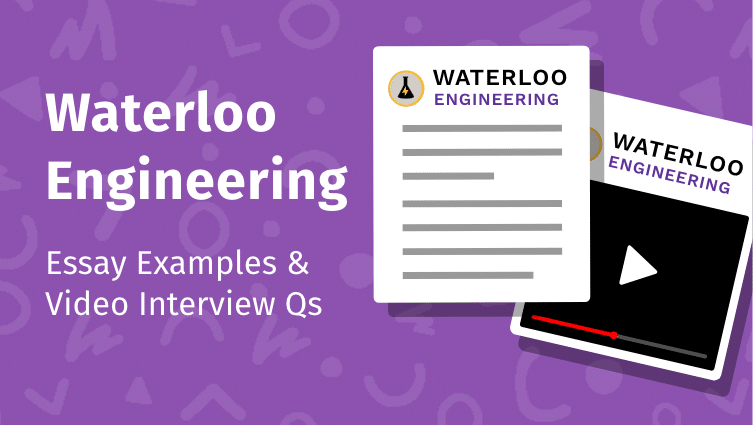
Application Prep
Waterloo Engineering Interview Questions & AIF Examples 2024/2025
If you are looking for Waterloo Engineering essay examples, video interview questions, and general guidance on the Admissions Information Form… Read more
WRITTEN QUESTIONS EXAMPLES
Remember that you will have to answer ONE written question, you will have 10 minutes to prepare and give a 300-350-word response.
If you need help preparing for your written question, connect with a coach any time for support.
Personal Profile – Written Question Example 1:
Here’s an example of a U of T Engineering Personal Profile written answer to the Personal Question:
“Choose between teamwork, inclusivity, and community building to describe an experience that you had in the past two years, either in school or outside of school that enables you to develop that characteristic.”
REMEMBER: This is an EXAMPLE ONLY and is NOT meant for you to copy. Why? First and foremost, this is plagiarism and is a serious offence. Plagiarizing these essays will result in immediate disqualification from the admissions process. This can be easily detected using technology and application reviewers are usually trained and/or able to spot when an application isn’t original and does not align with an applicant’s background, personality, values, etc.
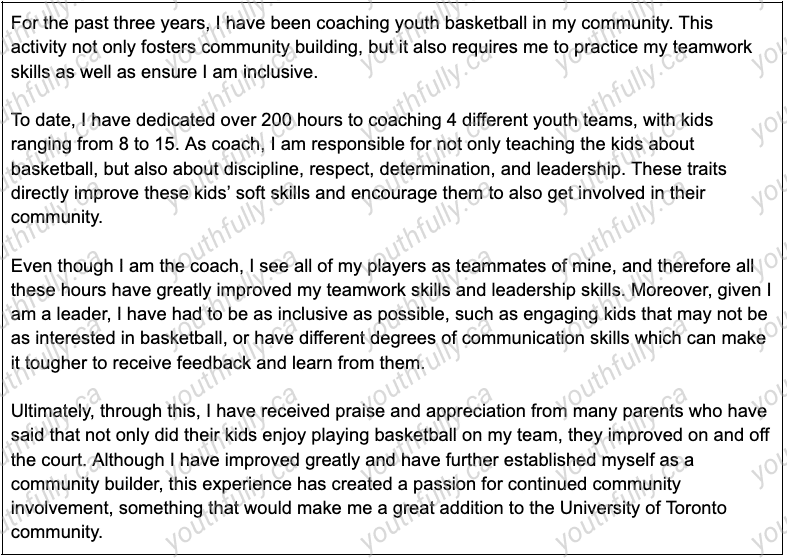
Personal Profile – Written Question Example 2:
Here’s an example of a U of T Engineering Personal Profile written answer to the Problem Question:
“Consider one of the more difficult mathematics problems you have solved recently. Explain the process you used to solve this problem. Be specific with both how you knew what to do, and why you chose to do things this way.”
REMEMBER: There is a 300-350-word limit for the written questions.
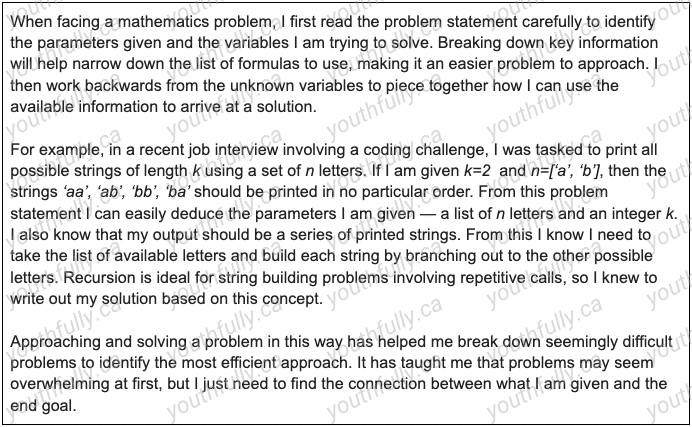
Need some help preparing your U of T Engineering Personal Profile questions? We’ve got your back! Connect with a coach now to get started.
Ace the U of T Eng Personal Profile.
get a youth coach™Alex
U of T Eng
Expert &
Youth Coach™
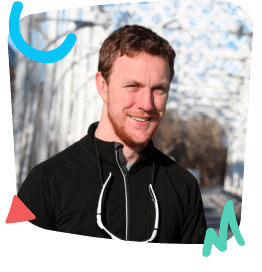
University of Toronto Engineering: Personal Profile Questions – Prep Tips
Many students ask us for tips for preparing for the U of T Engineering Personal Profile. Here are the ones we think will help you the most:
TIP #1: PRACTICE MAKES PERFECT
It can seem really scary to see yourself talking on screen and worrying about how you are coming across to the admissions committee.
Open up your camera and practice answering some of the Possible questions listed below. Recording yourself will help you get the hang of things and get comfortable with seeing yourself on camera. Learn more about effective interview prep tips here.
If you want to take your prep to the next level, work 1-on-1 with a coach and do some mock interviews so you know exactly what to do when you’re recording your answers for real.
TIP #2: ALWAYS ANSWER THE ENTIRE QUESTION
It seems silly, but it is common to get off track and later realize you didn’t answer the question. Break down each part of the question into smaller components, and address each one as you move through your answer. If you’re working on a written question, take some time at the end while you’re proofreading to make sure you’ve answered everything.
TIP #3: TAKE YOUR TIME
Sometimes when you know you have a limited amount of time you might speed through everything like a mad race against the clock. For the video questions, remember to take a breath and pause between your sentences to allow the reviewer time to process what you said. Focus on speaking clearly and slowly.
TIP #4: SHARE IMPORTANT INFO ABOUT YOU
Remember that every answer you give should tell the interviewer something about you that boosts your application, even if the question isn’t about you. Highlight your skills and experiences, show that you have thought about goals, and use the questions to help the admissions committee learn more about you. You’re going to be a great addition to their program — tell them how!
TIP #5: BE CONCISE
Your answers should be clear and to the point, leaving out unnecessary information. In the video questions, you don’t want to ramble — get to the point and be clear, providing clear examples and specific points that fully answer the question. The written questions are the same. 150 words isn’t that much so you have to make every word count. Get rid of information that is repetitive or doesn’t add value. It is better to have a short, concise answer than a convoluted answer that is redundant and possibly unfocused.
TIP #6: BE PROFESSIONAL (BUT ALSO HAVE FUN!)
When preparing for your video questions make sure that you come across as a young professional with something special to offer the program. How can you do this?
- Dress professionally
- Make sure the background behind your camera is empty
- Go somewhere that is quiet and free from distractions
- Sit up straight
- Maintain eye contact with the camera the entire time
Learn more here about effective physical, vocal, and mental cues that will help you leave a good impression.
While it’s important to be professional, it’s also important to have fun with these questions. The admissions committee wants to admit unique people who have a shining personality and the experiences to match. Show them who you are and be yourself.
TIP #7: DIFFERENTIATE YOURSELF
The admissions committee reviews thousands of applications. You’ll never stand out if your answers are the same as everyone else’s, so come up with answers that are unique. For example, if there’s a question that asks “Describe a time when you had to adapt” don’t simply talk about how COVID made everything more difficult. Instead, you can talk about an experience where you took on a challenge and tried something that hadn’t been done before. Then, shift the question into talking about your successes and what you learned from the experience.
For other interview prep tips that can help you stand out from other applicants, check out our Interview Skills Guide, which breaks down tips for preparing, performing, and perfecting your answers.
If you would like more tips to help you prepare, as well as the chance to up your game and do some mock video/written questions, connect with a coach today. Our coaches have helped hundreds of students conquer their Personal Profile questions and achieve admissions success!
You Might Also Like
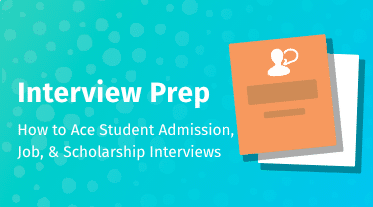
Skills Training
Interview Prep: How to Ace Student Admission, Job, and Scholarship Interviews
Even though you’ll do dozens of interviews during the course of your academic and professional career, you’ve probably had no… Read more
University of Toronto Engineering: Personal Profile Questions – Themes
Since you don’t know the questions until you’re doing the interview for real, it helps to think generally about a few key themes specific to you and your interest in the U of T Engineering program.
Then, as you’re completing your written and video responses, you can use these as general talking points to easily come up with an answer to many types of questions.
Here are a themes to get you started (read our Interview Prep Skills Guide for a complete breakdown of more themes):
U OF T ENGINEERING
This is probably the most important theme you should focus on. In your answers, you need to be able to specifically communicate why you want to attend U of T Engineering. It sounds obvious, but a lot of students actually have no idea.
Make sure to do lots of research and use it in your answer. The more depth to your research, the more differentiated your answer will be. In all of your answers, make sure you have a statement (or a ‘pitch’) at the end of each answer that shows exactly why you are the perfect fit for U of T and how you would add value to their program as a student. You should also be very familiar with the program, co-op opportunities, specializations, courses, professors, and resources offered.
Finally, look into the extracurricular activities and groups that make U of T Engineering unique. Even though you might not be asked about them directly, expressing an interest in these programs that the university funds can go a long way.
ENGINEERING (IN GENERAL)
You should easily be able to answer the question: “Why engineering?” You need to go beyond obvious answers like, “I’m good at math” or “I’ll be able to get a good job when I graduate.” Instead, relate your interest in business to a particular passion you have, like software engineering and sustainability or 3D printing technology. Talk about how this interest started as well as what it has taught you about yourself.
When thinking about your interest in engineering, take the time to understand what is personally appealing about it (and how it relates to U of T). This way, you’ll be able to prove exactly why you’re there and what you hope to get out of the program — and this self-awareness will really set you apart from other applicants.
EXPERIENCE & SKILLS
It is very likely that there will be a question that will ask you to provide more information about yourself. This can include an experience you’ve had, how you developed your interest in Engineering, your skills, your educational/career goals, and/or challenges you’ve faced and overcome.
The most important thing is to make sure you’re authentic and truthful. You also want to take the time to think about how your experiences have shaped who you are, as well as what you value and the vision you have for the future. Come up with 3-4 skills you have, like time management, leadership, and problem solving, that you want to work into your answers. In other words, you want to show that you have self-awareness. If you aren’t sure how to prepare for this theme, complete our Student Identity Blueprint™ or connect with a coach to get started.
COMMUNITY
The U of T Engineering admissions committee wants to accept students who are actively involved in the community, not just because it shows commitment, selflessness, and passion, but also because it highlights time management, leadership, and responsibility.
Make sure you have 1 or 2 examples of how you have been involved in your community and emphasize the impact you had by being involved. Finally, provide some personal insight about how this changed you as a person and contributed to developing your interest in engineering (if applicable).
CONFLICT
There is often a question about how you have dealt with difficult situations, like during a group project or as a member of a team. When answering these types of questions, don’t just focus on the problem, but more so the resolution or lessons learned while providing specific examples.
The point of conflict questions is so that the admissions committee can see how your experiences, accomplishments, skills, and values contribute to the way you view and interact with the world.
TEAM WORK
In addition to conflict in team settings, a lot of the time there are questions about how you have worked in a team effectively. Once again, make sure you have specific examples to clearly define how you succeed in the team, and not just the team’s success.
U of T wants to make sure that every student they admit to the program will be a valuable member of their own community, so positive and inclusive interaction with others is key for these types of questions.
TIME MANAGEMENT
There are questions that are really just structured around seeing how you handle pressure and manage your time. Be sure to really explain why the example you are giving is a good example of how you can manage your time and operate under stressful situations.
As mentioned above, it’s important for questions like this to be truthful. Don’t say “I am NEVER late for anything!” or “I’ve never given something less than 100% when I ran out of time.” This just isn’t true (for anyone!). Instead, be honest and talk about what lessons you learned because of these situations. For example, you could say that you learned that taking on too many projects meant that they weren’t being completed properly, so now you focus on quality not quantity when choosing projects to take on.
If you want to learn how you can align these themes to your unique interests and experiences, connect with a coach now.
You Might Also Like
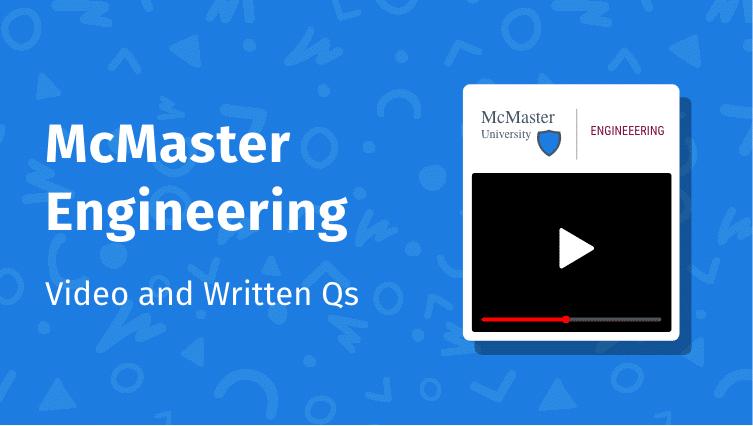
Application Prep
McMaster Engineering Supplementary Application & Video Interview Examples 2024/2025
If you are looking for guidance and examples for the McMaster Engineering timed written responses and video interview, then you’ve… Read more
Common Questions about the U of T Engineering Application & Personal Profile
Here are some answers to the most frequently asked questions we receive from students about the U of T Engineering Online Student Profile and Personal Profile.
Do you need a Personal Profile for U of T?
Yes. The Personal Profile (which is a section in the Online Student Profile) is a mandatory component of your application. If you do not submit it, your application will not be considered.
How do I complete the University of Toronto Engineering Personal Profile?
The first step is submitting your OUAC application (101 application for current high school students and 105 application for transfer students and all other applicants). When you’ve done that, U of T will send you an email with instructions within 7-10 days about how to set up your JOIN U of T account.
Then, you will log into the Engineering Applicant Portal, where you will fill out all the sections of the Online Student Profile (OSP), including the Personal Profile. The video and written answers for the Personal Profile are completed through a third-party site (which you will automatically be redirected to in the ‘Personal Profile’ tab of the OSP.
What’s in the U of T Engineering Personal Profile Interview?
You will have to answer 3 random questions. 1 question will be written (with 10min to prepare a 300-350 word response) and 2 questions will be video (with 2 minutes to prepare and 2 minutes to answer for each question).
- The first question (video) will usually be a personal question that asks you to introduce yourself and talk about who you are and your interests (specifically in engineering).
- The second question (written) will be a short essay (300-350 words) where you talk about an experience you’ve had that has taught you something, allowed you to grow, built your skills etc.
- The third question (video) will be a problem-solving question, where you are given a situation or problem and you’re asked to use critical thinking, logic, and evidence to present an answer.
Read more about how to answer personal questions and problem questions above, and check out our list of possible questions and written/video question examples.
You will have unlimited opportunities to practice but once you click ‘Start Interview’ you will get only 1 chance to complete your final questions.
Who evaluates the Personal Profile?
U of T says that the Engineering Personal Profile is evaluated by a group of individuals who they have hired to ensure that each student is evaluated fairly.
They take the Personal Profile into consideration, along with the entire Online Student Profile and your academic record. This is called ‘Broad-Based Evaluation’, which evaluates you beyond your grades, taking account your achievements, skills, activities, and more.
How do I prepare my Personal Profile for U of T?
Generally, the questions that will appear on the U of T Engineering Personal Profile are either: Personal Questions (all about you) and/or Problem Questions (objective questions where you flex your critical thinking skills).
To prepare for whatever questions you get, we recommend breaking the questions down into general themes, and then creating a series of talking points for each. That way, you can adapt your talking points to whatever question you get.
For a full breakdown of how to effectively prepare for the written/video questions, read the section above and check out our Interview Prep Skills Guide.
Does U of T Engineering require an interview?
Yes and no. The Personal Profile asks you to complete ONE written question and TWO video questions. However, you will NOT be interacting with a live person like you’d normally do during an interview.
However, you need to conduct yourself as if you were doing an interview with a live person, like dressing professionally, giving structured and memorable answers, showcasing your skills, experiences, and interests, and proving that you’d be a great fit for the program.
What do I need for the U of T Engineering Online Student Profile?
There are 6 sections in the Online Student Profile:
- Engineering Program Selection: Rank the engineering programs you want to be considered for.
- Academic Timeline: Outline your academic activity from Grade 9 to present.
- Academic Profile: List any secondary and post-secondary courses you have taken, as well as any standardized tests.
- Interest in PEY Co-op: State whether you plan on doing a Professional Experience Year (PEY).
- Extracurricular Involvement: Detail your ECs outside of the classroom.
- Personal Profile: Answer 3 randomly selected questions (1 written and 2 video questions).
All of these sections as well as your required documents are mandatory for a complete application. Check out this section above for a complete breakdown of the application.
Find the mentor you’ve been looking for.
get a youth coach™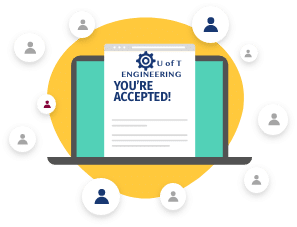
You’ve Got a Dedicated Coach in Your Corner
For over a decade, we have worked with thousands of students to help them achieve more than they ever thought possible.
Our coaches have a strong success rate supporting students as they apply to U of T Engineering, among other top university programs.
Our 1-on-1 Youth Coaching fills that gap that most high schools miss. We can help you build self-awareness through probing questions and assessments, set bigger goals to elevate your extracurriculars and future career plans, and improve skills that matter on supplementary applications, such as interviewing, written communication, critical thinking, and creativity.
We use a coaching methodology, called ‘full student’ development, that’s been proven to increase your chances of admission to top-tier universities and obtaining competitive jobs/internships.
So, what are you waiting for? Fulfill your post-secondary potential with the mentorship and coaching you’ve always wanted! 🙂
IMPORTANT: Want to share information and/or images from this resource on your own website, blog, article, etc.? Please ensure you reference content of any kind published by Youthfully Inc., in whole or in part, using the following statement: (1) Our Organization (Youthfully Inc.); (2) The title of our content/resource; and (3) the URL to our webpage where the content was originally posted. For example: “Sourced from: Youthfully Inc., ‘University of Toronto Engineering: Personal Profile Questions Prep Tips & Examples,’ https://youthfully.com/u-of-t-engineering-personal-profile-questions-examples.” Not doing so is an infringement of copyright and is illegal. We spend significant time developing resources for students, so please take a few seconds to ensure they are referenced properly.
DISCLAIMER: While the information in this blog is considered to be true and correct at the date of publication, and although our team makes every attempt to ensure that the information is accurate and vetted by university staff, Youthfully is not in any way liable for the accuracy of any information printed and stored or in any way interpreted and used by a user.

